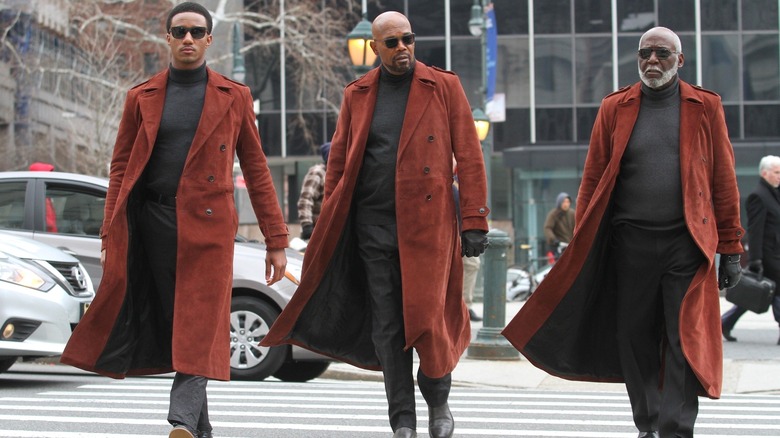'Shaft' Review: Apart From Samuel L. Jackson, There's Little To Dig About This Generic Action Sequel
In 2019's Shaft, the latest film to take on the name of the 1971 Blaxploitation classic, Samuel L. Jackson's John Shaft II bemoans the softening-up of the younger generation, and their fixation with tight pants, coconut water, and lemon towers. "Men need to be men," he declares to his straight-laced son John Shaft Jr. (Jessie Usher), mourning the good old days when real men shot first and asked questions later. But there's something to mourn about the new Shaft's shift from a cop thriller to sitcom, and how it spends more time making digs at the very millennial audience that it's supposedly appealing to than reminding the us of why we dug Shaft in the first place.
Shaft trades the franchise's Blaxploitation action for a buddy-cop routine that only works by the sheer force of Samuel L. Jackson's charisma. But even Jackson can't will this movie into being more than a creaky action-comedy that zaps out everything that made the original Shaft such a vibrant and time-honored classic.
When John Shaft first burst onto the scene in all his leather coat-wearing, ammo-packing glory in Gordon Park's 1971 Shaft, Richard Roundtree's private detective became an instant icon of American cool. John Singleton's 2000 sequel effectively utilized the charismatic presence of its star Samuel L. Jackson to bring a modern thriller bent while basking in the post-Quentin Tarantino era of Blaxploitation nostalgia. The 2019 Shaft understandably had a difficult time bringing Blaxploitation to a new generation — so firmly rooted the genre is in the social and racial context of the '70s, and so oft-parodied it is. So rather than become the butt of the joke, the latest Shaft decides to turn the jokes on the audience, pointing fingers at them for growing soft and pliable while the real men disappeared.
The debate of real masculinity takes place mostly in Usher's John "JJ" Shaft Jr., the mild-mannered son of Shaft II who has grown up safely removed from his father's life by his protective mother Sasha Arias (Regina Hall, doing her best in a thanklessly screechy role). In a laughably condescending montage of the JJ's childhood as seen through clippings of big pop culture moments and the rise of the dreaded internet, director Tim Story (Ride Along) shows right off the bat that the biggest criminals in Shaft won't be drug lords or pimps: they will be millennials. Story can't hide his disdain for the Me Generation and their rule-abiding, women-respecting ways, and Usher gets to shoulder all that in strings of tiresome jokes, mostly from his father, that poke fun at his effeminacy and his inability to ask out his long childhood crush (Alexandra Shipp, whose only direction apparently was "look pretty and act feisty").
Working at a cushy job at the FBI and content to proudly call himself a data analyst, JJ's life gets shaken up when his best friend Karim (Avan Jogia) dies of a supposed overdose. Suspicious of the circumstances, JJ turns to his father for help in investigating the vast conspiracy, and finds himself face-to-face with the kind of hardened street criminals — and at one point, a sinister organization that seems to be staffed exclusively by male models — that he had spent all his life avoiding.
Shaft puts to test the question of whether a movie can skate by on just Samuel L Jackson, Samuel L. Jackson-ing with your straight man of the week. (See: The Henchman's Bodyguard, Captain Marvel, etc.) The answer: No. But, surprisingly, Jackson and Usher's buddy-cop rapport is one of the few saving graces of Shaft. Millennial and gay jokes aside, Jackson is the embodiment of charisma and is clearly having a blast in this film, while Usher is a satisfactory straight man — though without the equivalent charm of a Ryan Reynolds or the talent of a Brie Larson. The film is at its best when Jackson and Usher are playing off that generational clash, with Story sometimes turning the comedy back on Shaft II and his inability to use a computer. But then the chords of Isaac Hayes' Oscar-winning Shaft theme start playing again, and we're back to the gushy idolatry of masculinity.
However, Shaft does make some gestures at a deeper commentary on toxic masculinity with its depiction of Shaft II as a deadbeat dad. Pushing 70 years old, the P.I. is still living life much as he did 20 years ago, cycling through an endless string of one-night stands and beating up the same gang members and drug dealers. It's almost sad, and the film makes some attempt at addressing this, letting Jackson ponder his lost chance at a happy family and life as a father. Shaft gets so close to commenting on that performance of masculinity — which in the '70s was itself in question, as films of the time grappled with how a rapidly changing society was affecting traditional ideas of the rugged individual — but rather than interrogate that idea of the hyper-masculine ideals of the '70s and late '90s, Shaft seems desperate to return to those times.
Richard Roundtree's appearance as the original Shaft hammers this in, as the first badass P.I. is revealed to live in a luxurious condo that looks like it had been frozen since the '70s. But when the three Shafts unite for a final showdown, Shaft still is unable to recapture that rich, electric energy of the Blaxploitation that it has been alluding to the entire film. Instead, Shaft plays more like an Expendables version of the original films, a shadow of its former self that revels in a cartoonishly hyper-masculine nostalgia of a bygone era.
/Film Rating: 5 out of 10
